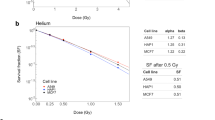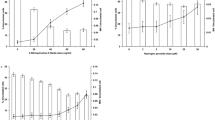Abstract
We have studied the effect of reduced dose rates of radiation on neoplastic transformation using the C3H/1OT1/2 mouse embryo-derived cell line developed by Reznikoff et al.1. In this cell system, transformation can be measured by scoring the foci of piled-up cells that occur after the loss of contact inhibition of growth. We report here that reduction of the dose rates of fission-spectrum neutrons (of mean energy 0.85 MeV) from 38.5 or 10.3 to 0.43 and 0.086 rad min−1 has no effect on cell killing but increases transformation frequency. These data are in contrast to previously published results obtained with 60Co γ rays where reduction of the dose rate resulted in a marked reduction in transformation frequency2,3. Although cancer induction in man involves many factors besides those at the cellular level, the implication from our findings is that the risk of cancer induction due to work-related exposure to neutrons in the nuclear power industry may be greater than previously thought.
This is a preview of subscription content, access via your institution
Access options
Subscribe to this journal
Receive 51 print issues and online access
$199.00 per year
only $3.90 per issue
Buy this article
- Purchase on Springer Link
- Instant access to full article PDF
Prices may be subject to local taxes which are calculated during checkout
Similar content being viewed by others
References
Reznikoff, C. A., Brankow, D. W. & Heidelberger, C. Cancer Res. 33, 3231–3238, 3239–3249 (1973).
Han, A., Hill, C. K. & Elkind, M. M. Int. J. Radiat. Biol. 37, 585–589 (1980).
Han, A., Hill, C. K. & Elkind, M. M. Cancer Res. 40, 3328–3332 (1980).
Han, A. & Elkind, M. M. Radiat. Res. 74, 88–100 (1978).
Han, A. & Elkind, M. M. Cancer Res. 39, 123–130 (1979).
Sinclair, W. K. Division of Biological and Medical Research, A. Rep., 29–31 (Argonne National Laboratory, 1970).
Sinclair, W. K. Division of Biological and Medical Research, A. Rep., 152 (Argonne National Laboratory, 1973).
Ngo, F. Q. H., Han, A., Utsumi, H. & Elkind, M. M. Int. J. Radiat. Oncol. Biol. Phys. 3, 187–193 (1977).
Ngo, F. Q. H., Utsumi, H., Han, A. & Elkind, M. M. Int. J. Radiat. Biol. 36, 521–530 (1979).
Thomson, J. F., Williamson, F. S., Grahn, D. & Ainsworth, E. J. Radiat. Res. 86(3), 559–572, 572–588 (1981).
Vogel, H. H. & Dickson, H. W. Abstr. 29th a. Meet. Radiation Research Society, Minneapolis (1981); Radiat. Res. 87(2), 453 (1981).
Fry, R. J. M. Int. J. Radiat. Oncol. Biol. Phys. 3, 219–226 (1977).
Ullrich, R. L. & Storer, J. B. Abstr. 29th a. Meet. Radiation Research Society, Minneapolis (1981); Radiat. Res. 87(2), 454 (1981).
Author information
Authors and Affiliations
Rights and permissions
About this article
Cite this article
Hill, C., Buonaguro, F., Myers, C. et al. Fission-spectrum neutrons at reduced dose rates enhance neoplastic transformation. Nature 298, 67–69 (1982). https://doi.org/10.1038/298067a0
Received:
Accepted:
Issue Date:
DOI: https://doi.org/10.1038/298067a0
This article is cited by
-
Dose and dose rate extrapolation factors for malignant and non-malignant health endpoints after exposure to gamma and neutron radiation
Radiation and Environmental Biophysics (2017)
-
Assessing the risk of second malignancies after modern radiotherapy
Nature Reviews Cancer (2011)
-
Chromosome aberrations induced in human lymphocytes by U-235 fission neutrons
Strahlentherapie und Onkologie (1997)
-
Biological dosimetry in astronauts
La Rivista del Nuovo Cimento (1996)
-
A general formulation of the concept of independent action for the combined effects of agents
Bulletin of Mathematical Biology (1994)
Comments
By submitting a comment you agree to abide by our Terms and Community Guidelines. If you find something abusive or that does not comply with our terms or guidelines please flag it as inappropriate.



